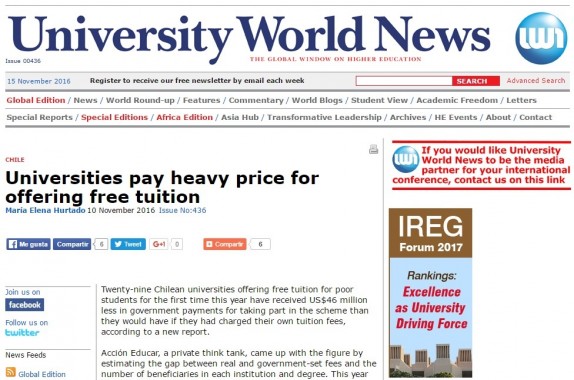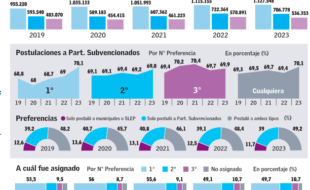University World News: Chile; Universities pay heavy price for offering free tuition

Por M. Hurtado
Twenty-nine Chilean universities offering free tuition for poor students for the first time this year have received US$46 million less in government payments for taking part in the scheme than they would have if they had charged their own tuition fees, according to a new report.
Acción Educar, a private think tank, came up with the figure by estimating the gap between real and government-set fees and the number of beneficiaries in each institution and degree. This year 138,812 of Chile’s 1.1 million higher education students studied for free.
“During 2016, [free tuition] fees set by the government did not match actual fees in 29 of the 30 universities that signed up for the new policy, even when adding the 20% supplement paid by the government to make up for the difference,” concludes the report, published last week.
“This reveals the inability of the government to estimate correctly the resources each institution needs to carry out its teaching project… The price-fixing system damages projects that charge high fees, as they are also banned from making profit on quality if affected.”
The report also found that total deficits soar when the number of students receiving free tuition is high, as happened this year with Universidad de Chile and Universidad Autónoma de Chile, and-or the tuition fees charged are also high, which is the case with Universidad Diego Portales and Universidad Finis Terrae.
Smaller shortfall
The Ministry of Education’s own analysis, however, showed that only 15 of the 30 universities providing free tuition have suffered financially and that the total shortfall was smaller: US$32.3 million, which is reduced when other government support funds such as those for research for private universities and operating costs for public ones are counted in.
Education Minister Adriana Delpiano put down the deficit clocked up by some universities to the high fees charged for some degrees which bunch up teaching with research and other costs unrelated to teaching.
“The figures in Acción Educar’s study do not reflect the economic reality of universities. The gap is only nominal since it does not take into account that the shortfall is reduced because universities that signed up for free tuition spend less on scholarships, receive research support and have enrolled more students. The financial gap subsists nonetheless,” Carlos Peña, rector of Universidad Diego Portales, which appears with the highest average deficit per beneficiary, told leading daily El Mercurio on 9 November.
The Ministry of Education has acknowledged that the gap between real and fixed tuition fees will still be there for at least two more years.
“Two years in this situation is far too long for a university such as ours that carries out a lot of research, has many full-time teachers, runs a publishing house and is bent on influencing public policies,” adds Peña.
The prestigious Pontifical Catholic University of Chile – which ran the largest deficit according to the Ministry of Education – has long warned that if the free tuition policy is not properly financed, in the medium and long run the institutions may have to reduce quality to make ends meet.
This may be happening already. Cristián Nazer, rector of Universidad Finis Terrae, the third most affected according to the Acción Educar report, says that this year they failed to receive US$3.4 million due to the free tuition policy.
“We have absorbed the cost by postponing infrastructure and research projects,” Nazer said, adding that according to their financial projections, they think they could stick with the free tuition policy for another year.
Proposed solutions
Universidad Alberto Hurtado’s rector, Eduardo Silva, agrees that the financial gap is not sustainable (El Mercurio, 9 November).
“Fine-tuning the fixed fees set by the government so that they take [into account] the real costs of heterogeneous universities is a must,” he says.
Others, such as Raúl Figueroa, Acción Educar’s executive director, add that in view of the financial cost of the policy, the government should not extend it beyond the 50% of vulnerable students that already enjoy this benefit.
President Michelle Bachelet promised to provide free higher education for 70 of Chile’s poorest families by the end of her term in office in 2018, but the country’s economic downturn has prevented her from progressing towards that goal.
The government’s budget proposal for 2017 increases monies for free tuition substantially in the hope that other institutions such as CFs and ITPs will be able to join if they become non-profit.
In the uproar that followed Acción Educar’s deficit revelations, several rectors of free-tuition universities came out saying that they were aware of the financial cost but they still went for it because they wanted to knock down economic barriers preventing poor students from entering higher education.
Ver noticia en University World News.






